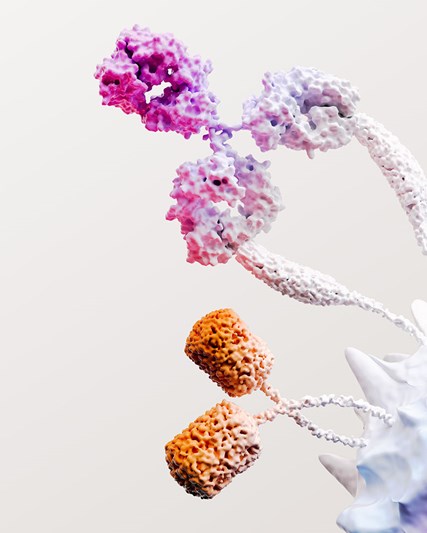Issued: London, UK
For media and investors only
GSK receives positive CHMP opinion recommending authorisation of daprodustat for symptomatic anaemia associated with chronic kidney disease in adults on chronic maintenance dialysis
GSK plc (LSE/NYSE: GSK) today announced that the Committee for Medicinal Products for Human Use (CHMP) of the European Medicines Agency has issued a positive opinion recommending authorisation of daprodustat, an oral hypoxia-inducible factor prolyl hydroxylase inhibitor (HIF-PHI), for the treatment of symptomatic anaemia associated with chronic kidney disease (CKD) in adults on chronic maintenance dialysis.
The positive CHMP opinion is based on data from three global phase III trials in dialysis patients from the ASCEND clinical trial programme, including ASCEND-D, which is a non-inferiority trial that assessed the efficacy and safety of daprodustat for the treatment of anaemia of CKD in adult patients on dialysis with a comparator of a standard of care erythropoiesis-stimulating agent (ESA) therapy. Results from ASCEND-D were published in the New England Journal of Medicine in November 2021 with additional results published in the New England Journal of Medicine supplementary appendix, which included dialysis (ASCEND-D) CKD patients. Data from two additional trials in the ASCEND clinical trial programme included incident dialysis (ID) patients (ASCEND-ID (PDF - 3.4MB)), which were published in the Journal of the American Medical Association (JAMA) Internal Medicine in April 2022, and three-times weekly dosing in dialysis patients (ASCEND-TD), which were published in the Clinical Journal of the American Society of Nephrology (CJASN) in September 2022.
CKD is an increasing global health burden affecting 700 million patients worldwide, with an estimated one in seven patients also developing anaemia, resulting in increased morbidity, mortality and reduced quality of life.1,2,3 When not adequately managed in certain patients, it can result in exhaustion and limit the ability to function in day-to-day life. When left untreated or undertreated, anaemia of CKD is associated with poor clinical outcomes and leads to a substantial burden on patients and healthcare systems.4 There is an unmet need for convenient treatment options with efficacy and safety comparable to current treatments.
About daprodustat
Daprodustat, a HIF-PHI, belongs to a novel class of oral medicines being studied for the treatment of anaemia of CKD in adult patients not on dialysis and on dialysis. Inhibition of oxygen-sensing prolyl hydroxylase enzymes stabilises hypoxia-inducible factors, which can lead to transcription of erythropoietin and other genes involved in the correction of anaemia, similar to the physiological effects that occur in the human body at high altitude.5,6 Daprodustat is being developed to provide a convenient oral treatment option for patients with anaemia of CKD.
In February 2023, the US Food and Drug Administration (FDA) approved Jesduvroq (daprodustat) tablets for the once-a-day treatment of anaemia due to CKD in adults who have been receiving dialysis for at least four months. In June 2020, Duvroq (daprodustat) tablets were approved by Japan’s Ministry of Health, Labour and Welfare for the treatment of patients with anaemia of CKD not on dialysis and on dialysis. Duvroq is the market leading and preferred HIF-PHI in Japan.
About the ASCEND phase III clinical trial programme
The ASCEND programme included five Phase III trials to assess the efficacy and safety profile of daprodustat for the treatment of anaemia of CKD across the disease spectrum. The programme enrolled over 8,000 patients who were treated for up to 4.26 years. Results from all five trials were presented at the American Society of Nephrology’s Kidney Week 2021. Results from the pivotal cardiovascular outcomes trial, ASCEND-D, which investigated patients on dialysis, were published in the New England Journal of Medicine:7
- ASCEND-D (Anaemia Studies in CKD: Erythropoiesis via a Novel PHI Daprodustat-Dialysis) enrolled 2,964 dialysis patients with anaemia of CKD who were switched to receive daprodustat or ESA control from a standard of care ESA therapy. A uniform iron management protocol was instituted across both arms of the trial. The trial met its primary efficacy (95% confidence interval [CI], 0.12 to 0.24) and safety endpoints (hazard ratio, 0.93; 95% CI, 0.81 to 1.07). Results showed that daprodustat improved or maintained Hb within target levels (10-11.5 g/dL) for these patients, and the primary safety analysis of the ITT population showed that daprodustat achieved non-inferiority of MACE compared to ESA control.
Additional results (PDF - 3.4MB) were also published in the New England Journal of Medicine supplementary appendix, which included dialysis (ASCEND-D (PDF - 3.4MB)) CKD patients.
About anaemia of chronic kidney disease
CKD is characterised by progressive loss of kidney function. Anaemia is an important and frequent complication of CKD and is associated with increased morbidity, mortality and reduced quality of life. It is often poorly diagnosed and undertreated in patients with early-stage CKD. 8 Over 700 million patients suffer from CKD worldwide, and an estimated 1-in-7 of these patients have anaemia.1 When left untreated or undertreated, anaemia of CKD is associated with poor clinical outcomes and leads to a substantial burden on patients and healthcare systems.4
About GSK
GSK is a global biopharma company with a purpose to unite science, technology, and talent to get ahead of disease together. Find out more at gsk.com.
Cautionary statement regarding forward-looking statements
GSK cautions investors that any forward-looking statements or projections made by GSK, including those made in this announcement, are subject to risks and uncertainties that may cause actual results to differ materially from those projected. Such factors include but are not limited to those described under Item 3.D 'Risk factors” in the company's Annual Report on Form 20-F for 2022, GSK’s Q1 Results for 2023 and any impacts of the COVID-19 pandemic.
References
- [1]Bikbov B, Purcell CA, Levey AS, et al. Global, regional, and national burden of chronic kidney disease, 1990–2017: a systematic analysis for the Global Burden of Disease Study 2017. Lancet. 2020;395(10225):709-733.
- [2]Stauffer et al. Prevalence of anemia in chronic kidney disease in the United States. PLoS One. 2014;9(1):e84943.
- [3]Palaka E, et al. The Impact of CKD Anaemia on Patients: Incidence, Risk Factors, and Clinical Outcomes-A Systematic Literature Review. Int J Nephrol. 2020 Jul 1;2020:769;2376.
- [4]Hanna RM et al. Burden of anemia in chronic kidney disease: beyond erythropoietin. Adv Ther. 2021;38(1):52-75.
- [5]Ariazi JL, Duffy KJ, Adams DF, et al. Discovery and preclinical characterization of GSK1278863 (daprodustat), a small molecule hypoxia inducible factor-prolyl hydroxylase inhibitor for anemia. J Pharmacol Exp Ther. 2017;363(3):336-347.
- [6]Maxwell PH, Eckardt KU. HIF prolyl hydroxylase inhibitors for the treatment of renal anaemia and beyond. Nat Rev Nephrol. 2016;12(3):157-168.
- [7]Singh A, et al. Daprodustat for the Treatment of Anemia in Patients Undergoing Dialysis. N Engl J Med. 2021; 385:2325-2335.
- [8]St Peter WL, Guo H, Kabadi S, et al. Prevalence, treatment patterns, and healthcare resource utilization in Medicare and commercially insured non-dialysis-dependent chronic kidney disease patients with and without anemia in the United States. BMC Nephrol. 2018;19(1):67.



